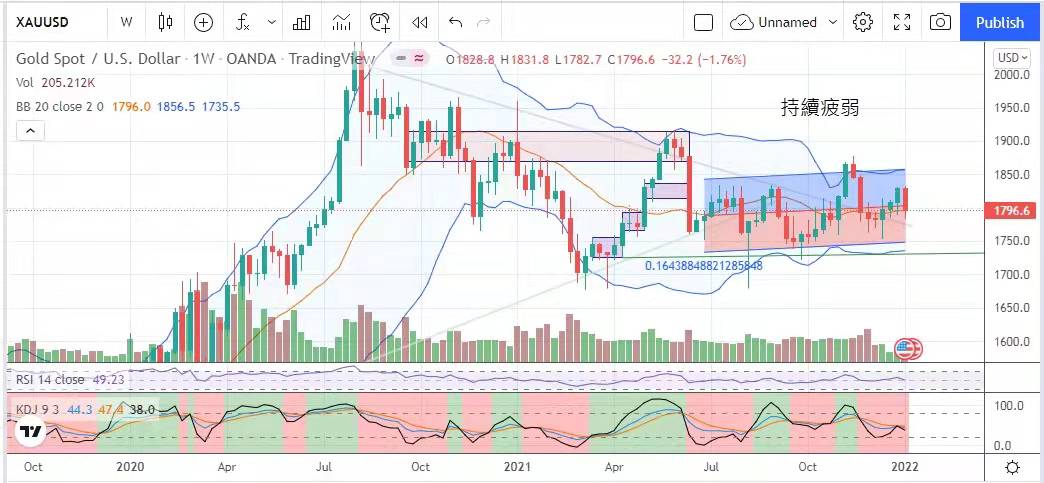Into the community
On January 10
Today's range:
Hawkish comments from the Fed's minutes of last month's meeting, which showed a faster pace of rate hikes, kept gold under pressure, and Friday's non-farm data was less than half of what the market expected, barely weak
The rally that brought gold back to $1,790 after last week's multiple breaks below $1,800 finally expired on Friday, when bears took over a two-week bridgehead known as a bottom reversal.
Become the next wave of upward resistance. Today is still bearish gold, recommended range of $1780 to $1800.
The Hong Kong government has been tightening its community quarantine policies, from eating out to limiting, since infected crew members began roaming the community, triggering multigenerational transmission and triggering a COVID-19 crisis in Hong Kong officialdom
With flights arriving from eight hardest-hit countries, the education bureau is expected to announce the end of face-to-face classes this week, but the bureau says it has no intention of doing so. On the economic impact of the fifth wave of COVID-19 in Hong Kong,
Financial officials pointed out that a renewed outbreak of the epidemic in Hong Kong would be a negative factor for Hong Kong's economic recovery. Besides, Hong Kong is an export-oriented economy and is vulnerable to a number of external changes, including external changes
The pandemic, continued bottlenecks in global supply chains and rising fuel and commodity prices have led central banks in the US and Europe to adjust monetary policy in the face of sustained inflationary pressures. If the situation continues, there is a chance to trigger funds
Losses could cause asset prices to fall and even deal a serious blow to the real economy.
The fifth wave of the novel coronavirus outbreak in Hong Kong, involving senior government officials, and the signal of the US interest rate hike, Hong Kong stocks fell first and then rose last week, with the Hang Seng index up 95.7 points or 0.41% over the week.
Although the outbreak is still raging, who experts say there is considerable evidence that the Omicron variant causes milder symptoms than its predecessor. Investors turned positive on risk markets, three of Europe's biggest stocks
Markets rose across the board last week, with Germany's DAX up 0.82%; France's Paris CAC index rose 0.93%; Britain's FTSE 100 index rose 1.36 percent. The US Federal Reserve minutes released on Wednesday showed a decline in the previous month
A number of officials at the U.S. policy meeting supported faster rate hikes. The record shows officials leaning toward three rate increases of 0.25 percent each in 2022, three more in 2023 and two more in 2024.
But faster and more frequent rate hikes cannot be ruled out.
The hawkish comments continued to affect investment markets for the next two trading days. In the US, for example, the Dow Jones Industrial Average fell from a record high on the day of the announcement. All three major Wall Street indexes posted losses last week under pressure to raise interest rates,
The Dow was down 0.29%; The STANDARD & Poor's 500 index fell 2.02%, while the Nasdaq fell 4.46%. Gold ended the week down $32.20, its worst performance in six weeks. Gold peaked last week at $1,831.8, but the Fed raised interest rates
The pace will pick up, with 10-year Treasury bonds pushing up to 1.73 percent on the fed's early rate hike, hitting gold at its worst at $1782.7, but Friday's non-farm data was half of what the market was expecting.
The weak data pushed prices back to close at $1796.6.
For detailed analysis and suggestions, please CLICK the link below to join the group and contact the administrator
https://t.me/mingtakchat
Previous Article Next Article


 Whatsapp
Whatsapp Telegram
Telegram

